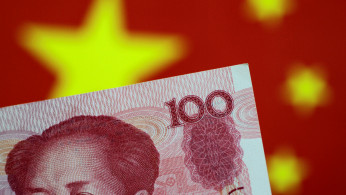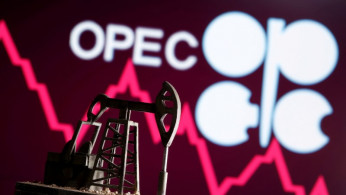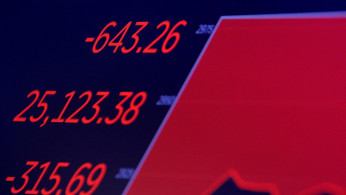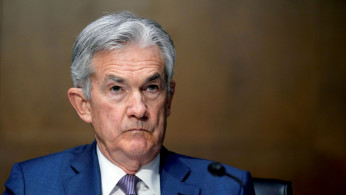Jerry Lin

The Latest
-
French Stocks Rebound as Le Pen Signals Willingness to Work with Macron
Marine Le Pen, leader of the far-right National Rally expected to gain a significant foothold in the upcoming French parliamentary elections, announced Monday that she would ensure cooperation with President Emmanuel Macron if her party succeeds. 
Marine Le Pen, leader of the far-right National Rally expected to gain a significant foothold in the upcoming French parliamentary elections, announced Monday that she would ensure cooperation with President Emmanuel Macron if her party succeeds. -
China’s Economic Recovery Stumbles Amid Weak Factory Output and Property Slump
China's recent economic data underscores a challenging recovery for the world's second-largest economy, revealing persistent weaknesses in industrial output and the property sector despite some policy support. 
China's recent economic data underscores a challenging recovery for the world's second-largest economy, revealing persistent weaknesses in industrial output and the property sector despite some policy support. -
Oil Prices Rise Amid Mixed Chinese Economic Data and Summer Demand Hopes
Oil prices climbed on Monday following their best week since April as traders sifted through a mix of economic data from China. U.S. crude oil and global benchmark Brent saw nearly 4% gains last week, fueled by expectations that the market will tighten in the third quarter due to increased summer fuel demand. 
Oil prices climbed on Monday following their best week since April as traders sifted through a mix of economic data from China. U.S. crude oil and global benchmark Brent saw nearly 4% gains last week, fueled by expectations that the market will tighten in the third quarter due to increased summer fuel demand. -
Oil Prices Tumble Amid Sliding Equities and Demand Concerns
Oil prices have retreated, paring back weekly gains, as sliding equity markets in Europe and Asia have compounded growing concerns about global demand. Brent crude futures dipped by 0.4% in London, reducing the week's advance to 3.5%. The outlook for crude oil has darkened following the International Energy Agency's (IEA) revised forecasts, which indicate a slowdown in consumption growth this year and warn of a potential long-term surplus. 
Oil prices have retreated, paring back weekly gains, as sliding equity markets in Europe and Asia have compounded growing concerns about global demand. Brent crude futures dipped by 0.4% in London, reducing the week's advance to 3.5%. The outlook for crude oil has darkened following the International Energy Agency's (IEA) revised forecasts, which indicate a slowdown in consumption growth this year and warn of a potential long-term surplus. -
OPEC Criticizes IEA's 2030 Oil Demand Peak Prediction as Unrealistic
OPEC Secretary General Haitham Al Ghais dismissed predictions that global oil demand will peak before 2030 as not only unrealistic but also dangerous. 
OPEC Secretary General Haitham Al Ghais dismissed predictions that global oil demand will peak before 2030 as not only unrealistic but also dangerous. -
Wholesale Prices Dip, Signaling Potential Relief from Inflation Pressures
Wholesale prices in the United States fell by 0.2% in May, providing fresh evidence that inflationary pressures might be easing. 
Wholesale prices in the United States fell by 0.2% in May, providing fresh evidence that inflationary pressures might be easing. -
Russians Rush to Buy U.S. Dollars as Ruble Plummets Amid New Sanctions
Russians are scrambling to buy U.S. dollars after the Moscow Exchange suspended trading in dollars and euros. This abrupt move comes in response to fresh U.S. sanctions, intensifying economic pressure on Russia amid its ongoing conflict with Ukraine. Videos circulating on social media show long lines at currency exchange points, underscoring the immediate impact of these sanctions on Russian citizens. 
Russians are scrambling to buy U.S. dollars after the Moscow Exchange suspended trading in dollars and euros. This abrupt move comes in response to fresh U.S. sanctions, intensifying economic pressure on Russia amid its ongoing conflict with Ukraine. Videos circulating on social media show long lines at currency exchange points, underscoring the immediate impact of these sanctions on Russian citizens. -
$4.5 Billion Fine Hits Another Crypto Firm as U.S. Continues Crackdown
The cryptocurrency industry faces another significant setback as Terraform Labs, a crypto company, has agreed to pay a $4.47 billion fine and is barred from engaging in crypto asset securities trading, according to documents filed by the SEC in Manhattan federal court on Wednesday. 
The cryptocurrency industry faces another significant setback as Terraform Labs, a crypto company, has agreed to pay a $4.47 billion fine and is barred from engaging in crypto asset securities trading, according to documents filed by the SEC in Manhattan federal court on Wednesday. -
Federal Reserve Maintains Interest Rates, Revises Forecast to One Rate Cut in 2024
The Federal Reserve opted to keep its key interest rate unchanged on Wednesday, signaling a more cautious approach to monetary policy as inflationary pressures persist. The Federal Open Market Committee (FOMC) indicated that only one rate cut is likely before the end of 2024, down from the three previously projected in March. 
The Federal Reserve opted to keep its key interest rate unchanged on Wednesday, signaling a more cautious approach to monetary policy as inflationary pressures persist. The Federal Open Market Committee (FOMC) indicated that only one rate cut is likely before the end of 2024, down from the three previously projected in March. -
U.S. Consumer Prices Steady in May Amid Signs of Cooling Inflation
The consumer price index (CPI) remained unchanged in May, indicating a slight easing of inflationary pressures. According to the Labor Department's Bureau of Labor Statistics, the CPI, a comprehensive measure of the cost of goods and services across the U.S. economy, showed no increase month-over-month but registered a 3.3% rise compared to the previous year. 
The consumer price index (CPI) remained unchanged in May, indicating a slight easing of inflationary pressures. According to the Labor Department's Bureau of Labor Statistics, the CPI, a comprehensive measure of the cost of goods and services across the U.S. economy, showed no increase month-over-month but registered a 3.3% rise compared to the previous year.